Site Menu:
| This is an archived Horseadvice.com Discussion. The parent article and menus are available on the navigation menu below: |
| HorseAdvice.com » Diseases of Horses » Nervous System » Neurological Conditions Not Covered Above » Shoulder Sweeny » |
| Discussion on Muscle Atrophy on Shoulder - Horse was Getting Better, but is Now Regressing | |
| Author | Message |
| New Member: george76 |
Posted on Wednesday, Sep 3, 2008 - 10:45 am: Horse: 10 year old barrel horse gelding that has not had a hard life when it comes to extensive training methods. Has muscle atrophy in right shoulderI moved my horse to Texas in September 2007. The place that I boarded him threw him out into an established herd of aggressive horses the morning after he had arrived. That, of course, was not instructed by me. He had gotten beaten up severely, but he didn’t seem to have any lameness issues. I moved him to another facility, waited approximately a month for him to heal (he had wounds on his back) and then started riding him again. This is when I started noticing that he was stiff on his front-end, though, he would usually walk right out of it. This continued into a move to yet another facility, but didn’t seem very bad for a month, or so. I trail rode him during that period with no sport conditioning. Starting in April of ’08, I noticed that my horse’s slight lameness was becoming a bit more noticeable. If he would stand for approx. five minutes in one place, he would walk off lame on his front-end, yet would eventually walk out of it. Trotting in a straight line, you could not tell he was lame. Trotting to the left, he was fine, also. Now, when I would have him trot to the right, he was noticeably lame, bobbing his head. When I would turn him to the left, from standing still, he would have great trouble getting around – he would stretch out his legs and then “hop” over. Turning to the right, from standing still, he would be very “ouchy” on that right leg and it appeared as if his feet were tender. When he was resting, he would place his front right leg out in front of him, as if to relieve some sort of pressure. As he grazed, or ate off the ground, he would bend his front right leg, and rest his hoof on the tip of his toe. I had the vet come out and he took 13 x-rays of his hoof and did a lameness exam (which turned out becoming a waste of money). He couldn’t find anything wrong with my horse’s feet, but also didn’t look anywhere else on my horse’s body to see if something else was wrong. He told me to put my horse to sleep, without giving me answer as to what was going on. The vet also told me that if I didn’t want to do that, that he could guarantee he could make my horse sound for 6 months by de-nerving him and giving him injections (once again, advice given without knowing what is wrong with my horse). After this, I called an equine chiropractic out to work on my horse. He noticed that my horse was stiff in his neck, particularly on the right side. I thought this was progress, though, there still wasn’t much for him to tell me. We did find out, though, that when my horse was attacked when he first arrived in TX, that the horses that kicked him, knocked his tailbone off-center. I just thought his muscle had atrophied back there and that’s why it looked like he had an indention on his tailbone. The chiropractic adjusted his tailbone and it is now mostly straight. When I asked if that might be causing his lameness, he said that he highly doubted it. Well, my horse didn’t seem to improve. If anything, he was getting lamer and lamer. At this point, I haven’t ridden him for two months. He has been out on the pasture, since then, just gimping around (his entire personality changed – he wasn’t happy anymore, stayed away from the herd, and didn’t move most of the day). In the meantime, I tried to have my farrier work with me, too. He told me that there is nothing wrong with my horse’s feet and that he thinks it is his shoulder, but he just doesn’t know exactly what is wrong with him. We did not do any special shoeing to him. I was going to have the vet come out again, because, this time, I had his pain narrowed down to his right shoulder and I was quite confident about it. I called the vet, told him what I thought, asked him if he thought the same thing, and he quickly said, “No. It’s his feet.” Of course, I didn’t make an appointment, because I did not think my vet was invested in any of this. The only option I had left, other than putting him to sleep, was a massage therapist. I had one come out and she began to work on him. She, of course, narrowed his pain down to his right shoulder and his stiff neck. It actually felt as if he had a block of wood in the middle of his neck. She then noticed that his right shoulder had atrophied and that he had no muscle in it, as well as no muscle in his right pectoral area. That makes sense, because he hasn’t been using his right front end for 2-3 months. She also felt scar tissue in between his chest. This is when I thought to myself that he must’ve gotten some sort of muscle trauma from when he first arrived to TX, from those horses beating him up. Anyways, she told me to do leg stretches with him and make him use his leg (i.e., ride him lightly and walk him over poles). So, that’s what I’ve been doing. He seemed to have gotten better from May until June/July – we were going on longer trail rides and he wasn’t holding his right foreleg out near as far. Muscle looked like it had started forming in his shoulder. He limped a lot less and turned a lot easier. He seemed to get his personality back, somewhat. I have also been feeding him MSM and Cortaflex, hoping that might reduce any inflammation. The problem that I am having right now, is that he seems to be regressing back to how he was before. He is holding his front right leg out even more and is having a hard time turning either direction. Yesterday, after I got done with a short trail ride on him, he limped quite noticeably. I don’t know what to do. I can’t trust my own vet to come out and help me, because he is too stubborn to change his mind or look somewhere else on my horse. Is there something I should’ve done during his rehabilitation that I didn’t do? I just want him out of pain. He seems quite uncomfortable. I can’t give him bute, because he is prone to stomach ulcers. Would B/L solution work? Should he not be moving around any? I’m really not sure what I should be asking, because I feel like I’ve run out of options for making this horse better. |
| New Member: george76 |
Posted on Wednesday, Sep 3, 2008 - 10:54 am: An addition... I have also been unable to continue his leg stretches on his front right leg, because he struggles against me. I'm assuming that it hurts. He also seems to be losing strength on that right side. When I pick up his left front leg, he doesn't stand very confidently - he almost refuses to give me that leg, too. |
| New Member: george76 |
Posted on Wednesday, Sep 3, 2008 - 4:21 pm: I found some photos of what my horse looks like when he stands still. What I noticed in the photos is that his muscles haven't "wasted" away - it's just that there is no tone to them. Perhaps I have posted in the wrong discussion section.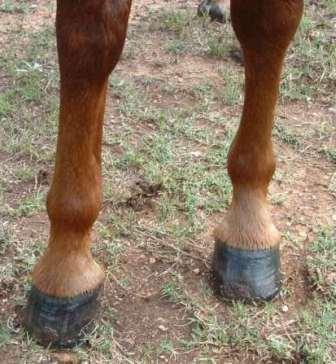 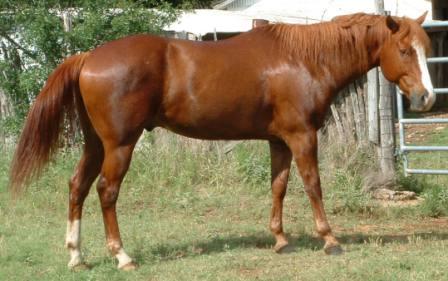 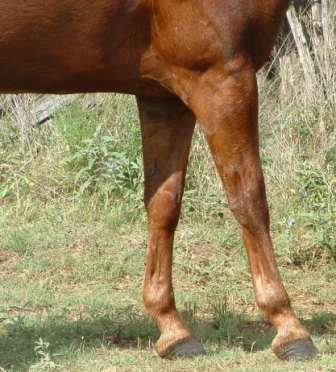
|
| Member: scooter |
Posted on Wednesday, Sep 3, 2008 - 8:20 pm: Ashley welcome to HA. I don't know much about shoulder problems, they are kind of rare in horses.Have you tried bute or banamine to see if it helps? Does hard ground make him better or worse? Is his limp a shuffle or a head bobbing limp?(like he's stiff) It does appear as if his hooves have some pretty significant rings on them. He's a beautiful horse, hope you get it figured out |
| New Member: george76 |
Posted on Wednesday, Sep 3, 2008 - 8:49 pm: Thanks for the welcome.I have given my horse bute, before, and it seemed to help, but I can't give it to him very often. He is very prone to gastric ulcers. The type of ground he walks/trots on doesn't seem to make him worse, or better. When he limps, it's a head-bob. When he turns, he strains so much, sometimes, that he groans and has to "hop" his front-end over. I've also noticed the rings on his hooves, now that you mention it. My farrier doesn't seem to have noticed them. I don't know what caused them. He hasn't had a fever since before I moved him to Texas and he hasn't been sick. Thank you for your compliments, too. He's so sweet and full of personality. I still have no idea what is wrong with him and I just don't know what else to try with him (or give to him) to make him progress out of this. |
| New Member: george76 |
Posted on Wednesday, Sep 3, 2008 - 9:11 pm: Here are some photos I took of his shoulder, tonight. The top portion of his shoulder blade (on the right side) does look a bit sharper than the one on the right. Perhaps there HAS been atrophy.Full Body RIGHT: 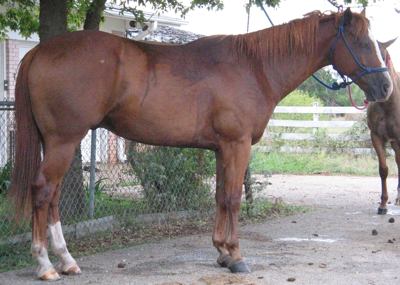 Shoulder RIGHT: 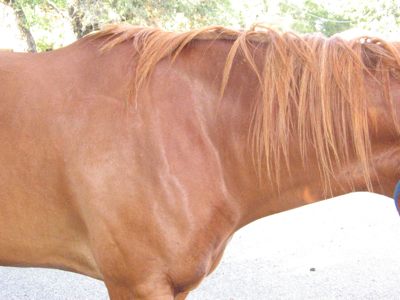 Shoulder RIGHT2: 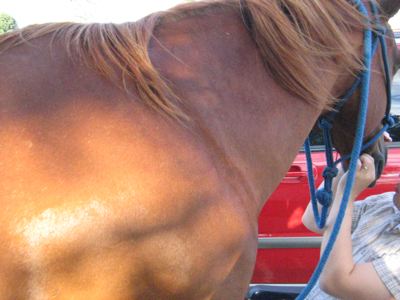
|
| Member: george76 |
Posted on Wednesday, Sep 3, 2008 - 9:16 pm: More:Shoulder LEFT: 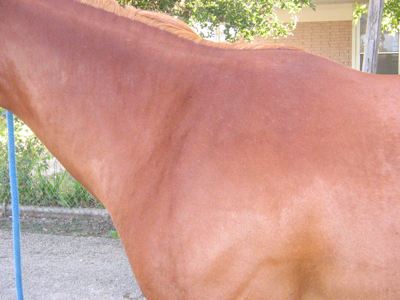 Full Body RIGHT2: 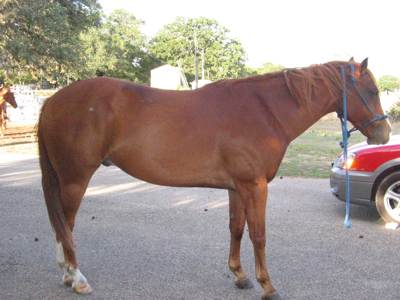 Full Body LEFT: 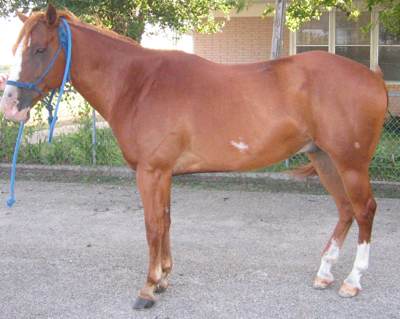
|
| Member: scooter |
Posted on Wednesday, Sep 3, 2008 - 9:18 pm: Ashley what does your vet think is wrong with his hooves?Personally I wouldn't ride or work this horse until you have a firm diagnosis. (I know how hard this can be sometimes) I would put him in a small area to help keep him from straining what ever is his problem, it sounds like he has some pretty good pain going on, and some rest may help him feel better. I worried when my horse was on bute too, but my vet said we would deal with the ulcers(if he got them later) he gave me gastro guard to give him also. Has your horse had an ulcer before? Remember hoof pain resembles shoulder problems VERY MUCH and vice versa. So don't completely rule out the hoof. Since your vet thinks it's his hoof what did he say to help it? I think maybe you should talk to your vet again and see exactly what he thinks is wrong. Keep your mind open, could be hoof, could be shoulder. |
| Member: george76 |
Posted on Wednesday, Sep 3, 2008 - 9:35 pm: Diane,When I asked about my horse's hooves, my vet didn't have an answer for me. I'm not sure his hooves had grown out enough to really notice the rings. As for riding him - I keep getting told to ride him. I didn't want to, but everyone keeps saying that he needs his muscle built up and that he needs to move around. I feel very badly for it. I do believe that I will stop. It's so hard to know what to do, and who to listen to, since no one seems to have an answer. I will also see if some arrangements can be made for him to be in a smaller paddock. Right now, he grazes on 80 acres. I always feel bad when I put him in a smaller area, because he gets so depressed, even with company. I used to stall him, but he would always get too stiff. In regards to ulcers - yes, he has had them (about 4 years ago). It was terrible. He had a 105 degree fever that wouldn't go down and he wouldn't eat, he'd lie down and stretch out and even when he stood he'd stretch his body out. I took him to the University of Florida teaching hospital (I was in FL, at them time). It took them a few days to figure him out, but when they finally scoped him, his stomach had ulcers all over the place. His cure? GastroGuard - just as your vet recommended. It is terribly expensive, but it certainly works. Awesome medication. When I had the vet out to look at my horse's feet, after he did the lameness exam and took x-rays, he told me that he has no idea what's wrong with him. Could be "tissue" damage, he says. Basically, he said that I could de-nerve him, give him injections or euthanize him (since he wasn't usable at the time). This guy was very young and I probably should've had an older, more experienced vet come out, instead. I've never seen a vet not be invested in what he was doing. That visit was over $400 and I learned nothing - other than that he doesn't have navicular. When I talked to my farrier, he thought it might be his feet, too, though, when we tried corrective shoeing, nothing helped. We thought that because the horse was taking pressure off the back of his hoof, that we should raise the heel. Didn't work. No difference. Now, my farrier doesn't think it's his feet. A problem that I'm having is that I'm new to TX and don't know any DECENT vets or places of information. I don't have a lot of money to spare (as most of us horse-people) for lots of visits to the vet that don't give me any information. Should I see about finding a specialist? |
| Member: scooter |
Posted on Wednesday, Sep 3, 2008 - 9:50 pm: Ashley, as Dr.O. says so many times has he had blocks? I guess that would be a good way to rule out shoulder or feet...or both. Dr.O usually ans. questions in the morning. I don't know if you can block a shoulder, but I know you can block a foot . . If your horse is in pain, I wouldn't think riding him could help much. You also stated he doesn't move much in the pasture and stays away from the herd, so it sounds like he may be a little depressed anyway. Good Luck, please keep us up to date with your handsome fella, hopefully Dr.O. can point you in the right direction. |
| Member: george76 |
Posted on Wednesday, Sep 3, 2008 - 10:02 pm: Diane,I really appreciate your help. It's been a while since he had blocks, though, they were done for another reason. The vet that I had come out, told me that if he didn't react to the blocks the last time, then there was no reason to do more. The problem with that was the blocks were done 4 years ago. I think the man was in a rush, or something. So, no. I haven't done those yet. I'm kicking myself for not standing up to him and telling him to do the blocks. Ugh. |
| Member: scooter |
Posted on Wednesday, Sep 3, 2008 - 10:09 pm: I think maybe I'd try a different vet, that doesn't even make sense, if they were done 4 yrs. ago for a different reason. What does "react" to blocks mean? |
| Member: george76 |
Posted on Wednesday, Sep 3, 2008 - 10:22 pm: Sorry, I said that part all wrong. Disregard the part of the sentence. I wrote it incorrectly and was meaning something else. What I really meant was that the blocks didn't seem to take the lameness away.I'm going to try and look for a vet in Weatherford (big TX horse country - reiners and the such). They might have the knowledge that I need. That, or Texas A&M. |
| Member: juliem |
Posted on Wednesday, Sep 3, 2008 - 11:37 pm: In the first photos above where he's standing with one foot pointing ahead--is that a typical stance for him? I would totally agree--get another vet! Sorry about the experience and the expense, but that was a pretty poor exam IMO. If that stance in the photo is typical, I would get a good set of radiographs of his hooves. He sure looks like he's in pain. Personally, I could not, would not, ride a horse that's in pain. The standard cowboy solution to any horse issue is always "ride the hair off him!" I guess it either made them bad enough to shoot or they got better in spite of it, but it just seems wrong to me. My gut tells me he has hoof issues. How did your vet rule out "navicular" which is a vague term meaning heel pain and it sure looks like this guy has some heel pain in those top photos! Good luck and especially good luck with another vet! What's with these guys? My son went to drug rehab once and his roommate was a vet. He told my son he got into vet. medicine because his patients don't complain when they don't get their pain meds! I hope Dr. O doesn't think I'm dumping on the profession, but we've had a two members recently with bad experiences with their vets. Lucky for me, I have, in addition to Dr. O, three excellent equine vet clinics within ten miles! I know, I'm blessed! All the vets are thorough, professional and caring, as I think most are. I know they aren't in it because it's easy or lucrative! |
| Member: astbury |
Posted on Thursday, Sep 4, 2008 - 5:34 am: Hi - Agree with the above. Pointing of the foot does look suspiciously like navicular disease - however, the way the horse is standing on one of the photos looks very much like a laminitic stance - and horizontal rings on the hoof could well be indicative of previous laminitic episodes. Am very familiar with these because my shetland has them, and has suffered a couple of laminitic attacks previously. I am pretty sure that if I went to our vet practice with the history you describe, the first diagnostic test they would do would be xray of the hooves.Your horse does look extremely uncomfortable. I would certainly keep him on a very deep bed until you get a proper diagnosis. Are the hooves hot? Can you feel increased digital pulse (you will need to get Dr O to describe how to check this, if he thinks it is appropriate - I am completely useless at it....) If it does turn out to be laminitis then the Australians have a very good product which I currently licence in for my shetland - as not available in the UK - called "Founderguard" which I think contains Virginiamycin. Along with very strict management, this has kept my Shetland sound now for well over a year. Good luck! |
| Member: astbury |
Posted on Thursday, Sep 4, 2008 - 5:35 am: Forgot to say - turning on tight circles on affected foot was virtually impossible with my Shetland when suffering an attack. |
| Member: scooter |
Posted on Thursday, Sep 4, 2008 - 7:46 am: The history of the horse does suggest laminitis...he was fine for a mo. after he was "attacked". Then you moved him and he is on 80 acres of grass and symptoms reappear. In April it starts again...good mo. for laminitis. My horse stood like that too, especially his right, when he was foundering. He would hold the rt. hoof on the tip of the toe.Another opinion would be the way to go, it could be his shoulder, but you need to figure out what to treat before he can get better. |
| Moderator: DrO |
Posted on Thursday, Sep 4, 2008 - 8:03 am: Welcome Ashley,The first step is to get a good diagnosis. I don't see anything in your post and the images that absolutely diagnose the shoulder as the cause of the problem and it does not look like shoulder sweeny where the scapula becomes downright skeletal. I would like you to find a veterinarian you trust and let them do a thorough lameness exam. This should start at the feet and I usually don't like to see the radiograph machine come out before the diagnostic regional anesthesia localizes the problem. For more information on the way that exam should be conducted see Diseases of Horses » Lameness » Localizing Lameness in the Horse. DrO |
| Member: george76 |
Posted on Thursday, Sep 4, 2008 - 11:33 am: Julie,This is usually how my horse stands (the front right leg sits out in front of him and he keeps pressure off his heel). I already have a set of 13 x-rays of both front feet from the middle of April. I also have another set from 4 years ago. When the vet compared the two, there were no significant changes in his hooves - so, he ruled out navicular. He also said that everything looks fine. I had noticed the rings on his hooves, so I also asked if the vet thought that my horse had foundered and he said there wasn't any rotation in the bones. So, who knows. He's showing the same symptoms as he did when the vet came out last, so I'm thinking nothing has changed, he just hasn't gotten any better. The farrier came out afterwards and shoed him like a "navicular" horse and that didn't alleviate any of the horse's discomfort. Jenny, I have felt my horse's hooves many times, throughout this ordeal, and never once have his hooves been hot or his digital pulses elevated. This is why I get so confused. He hasn't been showing signs of heat or swelling ANYWHERE. I appreciate your mention of a treatment for laminitis. If that is what he has, then I will certainly try it. Diane, I'm going to be getting a second opinion on all of his issues, as soon as I can. That seems to be the best option, right now. It is sad that the area that I live in, there aren't enough vets experienced with horses used for sport. I will be searching up toward the northern part of Texas for more experienced veterinarians. Dr. O, I've been trying to get a good diagnosis, because that's all I've been wanting since the beginning. I will be taking your advice and looking for a different vet. I have already looked at your article on how a lameness exam SHOULD be conducted. I will use this to my advantage when I take him elsewhere. I have a massage therapist coming out on Monday to work on him. He always seems to feel a little better when she comes out. I will let you all know what happens when I find a different vet. I very much appreciate everyone's help and concern. |
| Member: astbury |
Posted on Thursday, Sep 4, 2008 - 12:34 pm: Hi AshleyI know what you mean - I could feel heat in the pony's foot but I could never locate the digital pulse - let alone know if it was elevated! One point to bear in mind - although to be perfectly honest you'll drive yourself crazy with possibilities until you get a definite diagnosis - and which maybe Dr O could confirm, is that the fact that the pedal bone hasn't rotated doesn't mean the horse hasn't got laminitis. Rotation I think is the worst case scenario when sufficient of the sensitive laminae have died to enable the pedal bone to sink downwards towards the sole. My pony was in a lot of pain with diagnosed laminitis on the first occasion, and turning to the right was really difficult - but xrays showed absolutely no evidence of rotation. Unfortunately, during the last bout slight rotation had occurred. Best of luck and I hope you get your answers - and solution - soon. Meanwhile, I guess it wouldn't hurt to manage as a laminitis case - at least it means you feel you are doing something i.e.stop all exercise and box rest on a very deep sandy type bed to support the sole and put onto a laminitis recovery diet. My pony is on a Spillers feed called "Happy Hoof" which provides all the nutrients required in terms of nutrition. I'm sure you have the American equivalent. The only problem here might be if it turns out to be a shoulder issue, lack of any exercise might make it worth. I'm sure Dr O could advise on that. |
| Member: amara |
Posted on Thursday, Sep 4, 2008 - 12:54 pm: AshleyWhere in Texas are you? I live in North Central Texas (near Weatherford). There are a few vet facilities there (i mean equine hospital type facilities), with a lot of diverse vets. Cant remember the names of them, but it sounds like you will get some better help there. I am also relatively new to Texas (4 years), and come from an area where there were lots and lots of vets and you could always find someone who could get you on the right track, and were never to far from an equine hospital of some sort. its a bit different here. Good luck Mel |
| Member: george76 |
Posted on Thursday, Sep 4, 2008 - 1:02 pm: Oh, Melissa, I'm so glad that you posted.I live in NW Austin. I'm am fine going up to North Central TX, because that's where I figured that I would have the best luck. I was actually thinking about taking him to the Reata Equine Hospital. They just opened up a Podiatry facility. Who knows, though. I don't know the area well enough to have an idea of which equine vet/hospital is worth their weight in gold. I was in the same boat as you, before I moved out to TX. I'm from FL and there are good vets mostly EVERYWHERE there. I also knew a lot of people, so it was easy to get directed toward the right place. |
| Member: shanson |
Posted on Thursday, Sep 4, 2008 - 1:27 pm: Hi Ashley,I live in Austin and there are several good facilities in Central texas. There's Elgin Vet. hospital, which, short of going to Texas A&M, is the nearest major equine hospital. It's only about 30 minutes east of Austin. That's where I'd go if I were you. I don't know who to recommend there, though. You might ask who their best lameness specialist is. Dr. Dutton in Boerne, Texas is a well-known lameness expert in Central Texas. He's expensive, but good. I've never been to Retama, but stands to reason they'd be good. Let us know what you find out! ...sharon |
| Member: shanson |
Posted on Thursday, Sep 4, 2008 - 1:32 pm: Oh, I see now that you said Reata, rather than Retama... I don't know much about Reata, which I think is kinda new facility. |
| Member: george76 |
Posted on Thursday, Sep 4, 2008 - 1:43 pm: Sharon,I will certainly look into the vets that you provided. I didn't know about them, because I never knew anyone to ask. I appreciate your addition. |
| Member: erika |
Posted on Thursday, Sep 4, 2008 - 2:17 pm: Welcome, Ashley. What a baffling case! I hope you'll keep us all posted when you get some answers. He's a beautiful horse and I'll be watching for some good news that the mystery is solved and on its way to better.Erika |
| Member: judyhens |
Posted on Thursday, Sep 4, 2008 - 2:20 pm: Hi Ashley,I can appreciate your situation because we have a horse with a shoulder problem and it can be frustrating. We live in McDade, just east of Austin off 290. Elgin Vet Clinic is a tertiary care center with excellent vets. When we have a significant problem and want more sophisticated testing, we trailer to Tx. A & M. Only about 1 1/2 hours from the Austin area and has a tremendous faculty and staff. I wish you luck with your precious horse! Judy 0 0 \_/ |
| Member: george76 |
Posted on Thursday, Sep 4, 2008 - 2:28 pm: Erika,I will definitely keep you posted. Right now, we're trying to make sure our finances are together, so we can take him somewhere for a second opinion. Judy, You are the second person to suggest Elgin Vet Clinic & A&M. I'm going to look into those places. I appreciate everyone being so helpful and caring. |
is The Horseman's Advisor
Helping Thousands of Equestrians, Farriers, and Veterinarians Every Day
All rights reserved, © 1997 -
